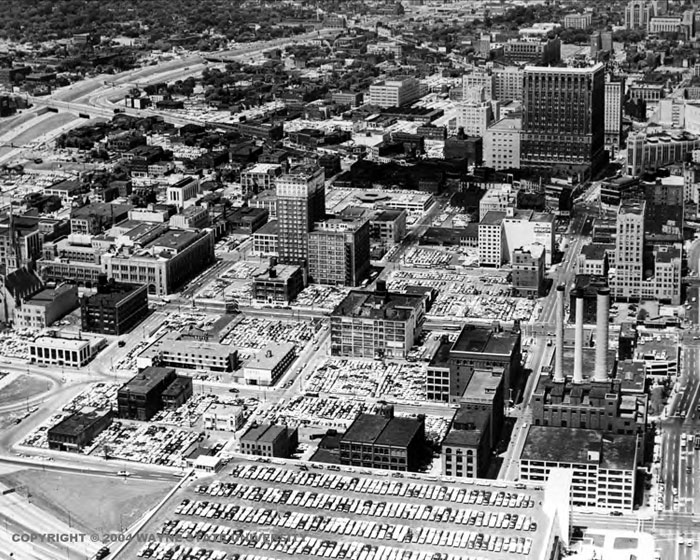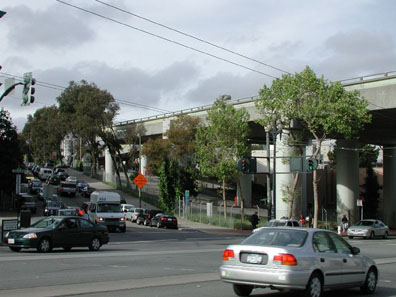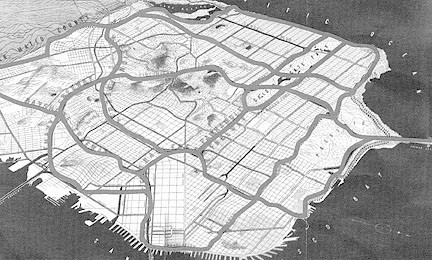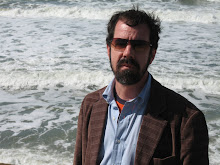The automobile is driving us poor. Forget the price of gas; there are several other huge outlying costs to automobile ownership, such as insurance, maintenance, licensing fees and other taxes, and parking. No wonder people are upset that gas is nearly four dollars per gallon.
In my mind, however, the price of gas is not the main issue. There are actually quite a few hidden costs to the gas we put in our tanks – namely the continued occupation of Iraq. Now the administration appears to be considering launching an attack on Iran. Expect much higher prices should this terrible blunder be made. The actual price per gallon of gasoline when these hidden costs are factored in is really 7 - 8 dollars per gallon (some estimates are as high as 10 dollars per gallon). That means that citizens who do not even drive are subsidizing the price of gas for those who do drive. If consumers could see those real numbers at the pump, I bet they'd start changing their driving habits quickly. But as it currently stands, the price of gas is ridiculously low and heavily subsidized.
It also stands to reason that the roads and parking considerations are also heavily subsidized, regardless of the occasional toll (which in itself is counterproductive to relieving congestion, conserving energy or reducing commute times). Suburban sprawl has nearly dictated that we all drive to our destinations, but even in these less than idyllic conditions, ask yourself if a bicycle will allow you to make certain trips. Can you walk? Right now, cars own the roads, but we can reclaim our streets. Have you ever wondered just how much space cars take up? Not to mention the visual clutter they make.
I have a little task for you, should you indulge me. Take a walk through your neighborhood, and when you do so, focus on automobiles and everything built to accommodate them. Take mental note as though you come from a place or time where automobiles do not exist. Simply observe the space they require, observe how inanimate the majority are, and how they simply occupy space and do very little in regard to actually moving people. Now imagine each car as a large sofa. What would you think if your neighbor parked his sofa in front of your house? Can you begin to see how the automobile is an anti-social device? Now imagine a vibrant street with people on it with no cars to be seen. People are much more interesting than metal boxes, are they not?
I commend to you a well written and informative article on the subject: "The Automobile Shapes the City", by Martin V. Melosi. I have posted a couple excerpts pertinent to our discussion:
Even cars at rest—in parking mode if you will—created problems for cities that few other forms of transportation faced. It is ironic that a technology designed to provide individuals with greater flexibility in meeting their transportation needs remains unused much of its life. “An adequate highway system—one affording completely free movement of vehicles—would still not solve our transportation problem,” noted one expert in 1950. “This is because the objective of every motor vehicle is a terminal. The average motor vehicle, for instance, is in motion about 500 hours a year; it is parked the remaining 8,260 hours.” More than forty years later, other experts expressed a similar sentiment: “If one were to set out the most inefficient means of transport, the auto might be the outcome. Consider, for example, the facts that the average auto is parked and unused for about 90 percent of its lifetime and that even when it is used, it is nearly empty.”

Detroit in 1962 – an abominable waste of prime real estate & blight on the city; car parks prevail.
Excerpt from same article: A parking study conducted in California stated that about 59 percent of the ground area in Los Angeles’ central business district (CBD) in 1960 was devoted to streets and parking, with about 35 percent for roads, streets, alleys, and sidewalks, and 24 percent for parking lots and garages not included in buildings with other purposes. During roughly the same period, acreage devoted to streets and parking in other urban cores was similar in scale or slightly less. In Detroit (1953), streets and parking made up 49.5 percent of the central city; in Chicago (1956), 40.7 percent; in Minneapolis (1958), 48.3 percent; Nashville (1959), 39 percent; and in Dallas (1961), 41.4 percent.
What one does not see here is the square footage of garages within buildings and the space reserved for street parking, so the amount of land required for parking cars and housing them is really quite astounding. We have destroyed our cities in the United States. There are few examples of vibrant cultural centers that remain, and in those few cases (such as San Francisco and New York City) the public fought and prevailed against carving their cities up with expressways. San Francisco made the wise decision to finally tear down the few expressways that were built, starting with the Embarcadero Freeway, and later the Central Freeway. Both neighborhoods are now revitalized, and visually pleasing.

Central Freeway Before
After

Had the planners had their way…truly would have been the death of my beloved city. (1948 plan)
Now it's time for the good news. There are options, and we live in a democracy where we still have a voice. Albeit, at this stage it might actually require wresting that voice back with a little civil disobedience. Nonetheless, the inspired documents of our founding fathers remain regardless of our leader's open defiance of them. Some people have rightly inquired why I have chosen the automobile as my personal adversary. Obviously we have bigger problems, there's the "war on terror", failing schools, lost jobs, destruction of the environment, loss of freedom, escalating health care costs and collapsing infrastructure. Why would I pick on the defenseless passenger car?
Here's how I see it, and my gratitude for following my leaps of logic. Currently we are "at war". It is not a war in the traditional sense. We cannot even see our enemy. I could go on for a thousand pages on this subject alone, but I will spare everyone. I think we can all pretty much agree than the main motivation behind our invasion and occupation of Iraq is the mere fact that it happens to sit on some of the world's largest oil reserves. We use a lot of oil in this country – some may say we are quite dependent upon it. A good deal of that oil is combusted in engines of automobiles. We have also created infrastructure and cities that are largely dependent upon automobiles as a means of getting around. If we begin to rethink this, redesign our existing cities and fund public transit, and perhaps have the vision to begin to build new car-free cities, we will decrease our dependence on foreign oil. We will no longer have to waste billions of dollars fighting global wars, and instead we can fund infrastructure, schools and healthcare, and in doing so we can create high paying jobs and rebuild our economy. We are on the verge of what can either become a global catastrophe, or a bright new future. The decision is ours. Now is the time.
May God help us.


2 comments:
I'm intuiting that it's going to be a catastrophe. However, since I've always hated carbon-molecule-burning-car-culture ever since being born and raised in Southern California, I'm only praying that the catastrophe happens while I'm still alive so that I can possibly enjoy a less car-centric culture. We shall see.
Maybe it'll take a catastrophe on a grand scale, but I think we're ripe for a revolution. There has never been a greater disconnect between government and the people. And I'm not talking Hilary in 08!
Post a Comment